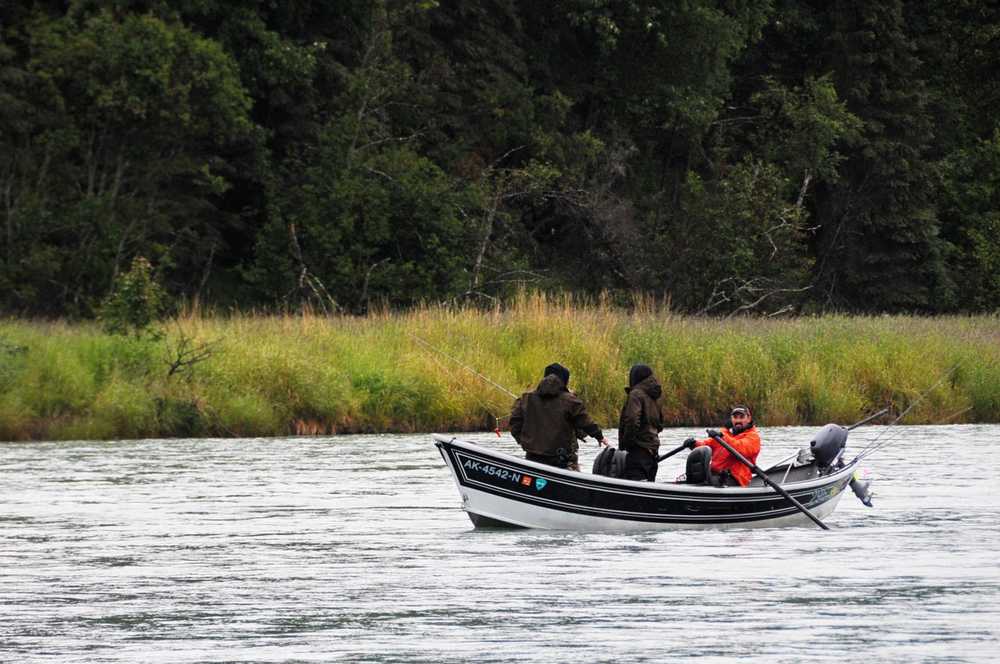The Board of Fisheries on Saturday reinstated the logbook and licensing program for sportfishing guides around the state.
The Alaska Department of Fish and Game brought a proposal to the board to mirror the requirements included in House Bill 41, which the Legislature passed in April 2016. However, there’s one key difference: the Board of Fisheries proposal included licensing and logbook requirements for freshwater guides and HB 41 did not.
Fish and Game has required sportfishing guides to be licensed and keep logbooks since 2004, when the Legislature passed a bill requiring it. The initial law included a 10-year sunset clause, and when the bill came up for renewal in 2015, it met some opposition because of issues with the logbook program.
The original bill included all sportfishing guide services, but Sen. Mike Dunleavy (R-Wasilla) amended it to exclude freshwater guides in April 2015. The bill was delayed until the following session and passed without the freshwater requirements.
Though the Kenai River Professional Guide Association originally supported the logbook program, thinking it would provide more data about the guide industry, it has become a major source of “paper violations” that particularly affect Kenai River guides, said Steve McClure, the former president of the Kenai River Professional Guide Association and one of the guides who originally went to Juneau to support the bill. Kenai River guides get hit twice when they have a logbook violation because they operate in the Kenai River Special Management Area, resulting in fines from Alaska State Wildlife Troopers’ tickets and suspensions from the Alaska State Parks enforcement, he said.
A major source of heartburn is the inaccessibility of the data guides are turning in, he said. Though guides have to turn in logbooks every week and will receive violations if they don’t, Fish and Game is several years behind on producing the data from the logbooks, McClure said.
“It isn’t the data — we love the data. It’s that you can’t get the data,” he said. “Here we are going into the Upper Cook Inlet Board of Fish meeting, and we don’t have that data.”
The tickets can cost more than $100, but the suspensions can cost a guide thousands, depending on how many clients the guide has to cancel on because of the suspension, said Gary Chamberlin, the current Kenai River Professional Guide Association president. The group hasn’t met to discuss the proposal since it passed but plans to do so, and to request the data before the upcoming Upper Cook Inlet Board of Fisheries meeting scheduled for February 2017.
The weekly deadline is a frustration for many guides, who run tight schedules during the fishing season, he said.
“During the summer, when the guides are working, a lot of times the only day they have … some of the guys work six or seven days a week, and it’s pretty tough to get those turned in, to make a special trip to run into the Fish and Game office or to get them mailed in,” he said.
However, the proposal Fish and Game brought to the Board of Fisheries included the freshwater registration and logbook requirements. Tom Taube, deputy director of the Division of Sport Fish, told the Board of Fisheries during its Lower Cook Inlet meeting in Homer on Saturday that the department relies on guide logbooks to gather information, and without the freshwater provision, there would be a gap in data collection.
Though the former iteration of the logbook program expired effective Jan. 1, 2015, Fish and Game Commissioner Sam Cotten used the department’s statutory authority to keep the program running. The expiration of the bill, though, meant the department didn’t get any additional appropriation to run the logbook program. When HB 41 was passed, it only included an appropriation for running the salt water logbook and registration program, which will cost about $204,600 annually in addition to the other costs to implement the new law, totaling about $273,800. The fees paid by guides will cover part of the costs, but not the costs of reporting, according to an April 2016 fiscal note submitted to the Legislature.
Reed Morisky, a Board of Fisheries member, proposed an amendment to the proposal to remove the freshwater requirements. The Legislature intentionally left the freshwater guide regulations out so it could work through the issues with the industry, and the department can continue the logbook and registration requirements through its statutory authority, he said.
“I would like to see a responsible, sustainable sportfishing industry, and I believe by doing this, it takes it back to the more appropriate body to deal with the issues facing the sportfishing industry,” he said.
Taube cautioned that if the board passed the amendment, the message would be perceived that the board didn’t want to include freshwater guides in the registration and logbook program.
“The cleaner way to do it would probably be for the adoption of (the original proposal),” he said. “I think ultimately that’s what we want, to include freshwater logbooks and registration, rather than going around the board process and putting it on the department move forward with the freshwater aspect of it.”
The board declined to take up the amendment by a 2-5 vote, with Morisky and board member Orville Huntington supporting it. After further discussion, the board unanimously passed the proposal as originally written, with board member Robert Ruffner saying it should be clear that the board didn’t want to get in the way of the Legislature working with the guides to solve some of the logbook issues.
“I want the record to clearly reflect that I don’t want to bind or hinder the Legislature solving the problems that the industry has that they’re trying to work out,” he said.
Reach Elizabeth Earl at elizabeth.earl@peninsulaclarion.com.

